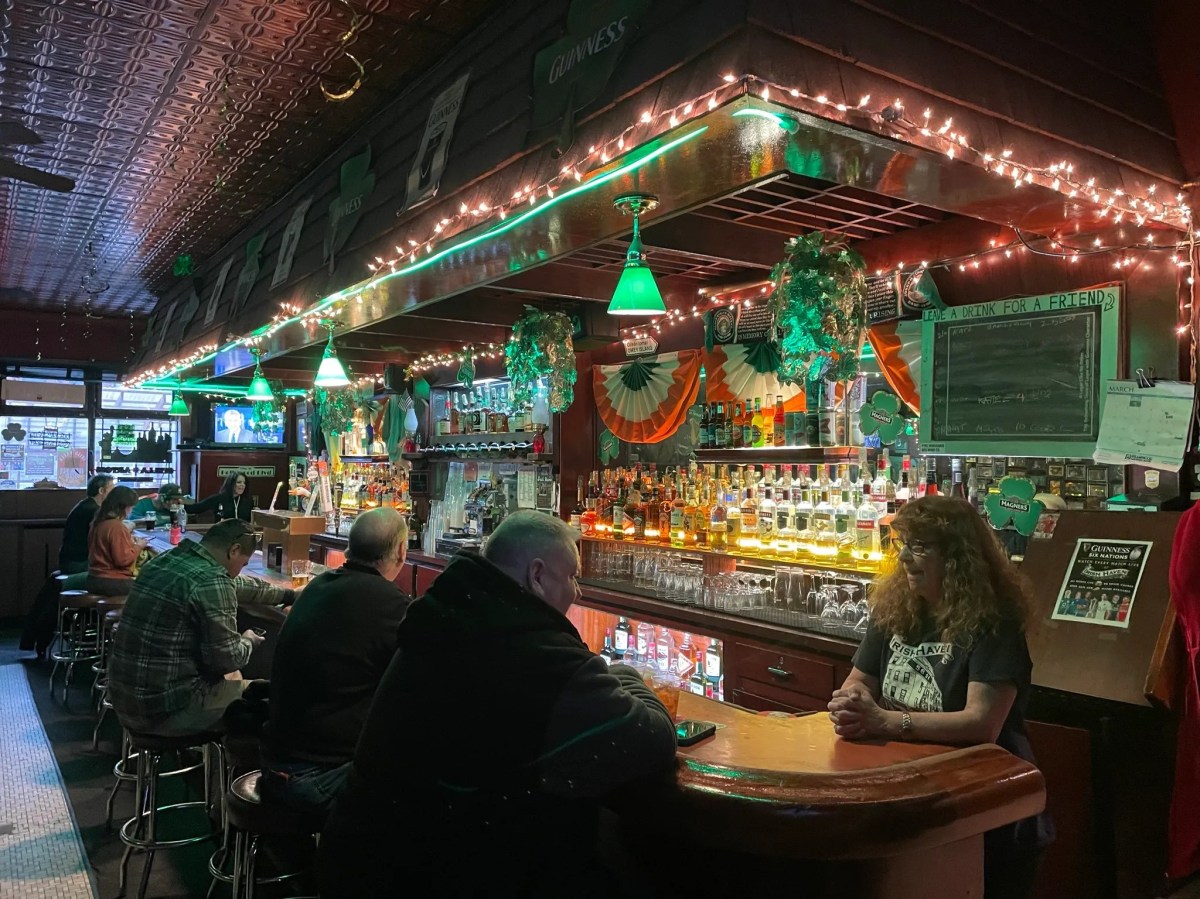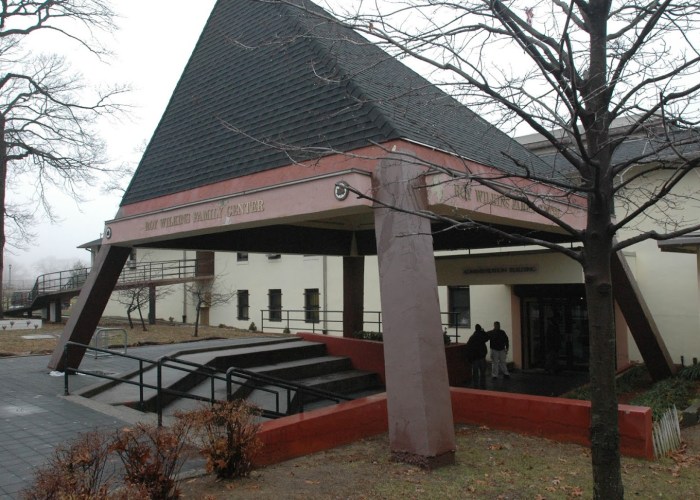By Bonnie Rosenstock
Discount stores, ethnic restaurants and small local businesses line the south side of E. 14th St. along the stretch of Alphabet City. Many of these congenial mom-and-pop shops have been serving the lower- and middle-income Lower East Side and Stuyvesant Town communities for decades with their affordable prices and personal customer relationships. But it is becoming more and more difficult for these establishments to survive, caught between rising rents and gentrification. Charlies, at 532 E. 14th St. between Avenues A and B, a neighborhood staple for the past 41 years, is the latest to fall victim to this trend.
On March 31, Bill Johnson, the owner of Charlies, will have to pack it in, and the whole neighborhood is mourning. As Johnson was recently speaking to a visitor about his situation, loyal customers were constantly interrupting to express their feelings of sadness, anger and frustration.
“You’re not closing are you?” asked an incredulous woman who has been in the neighborhood for 30 years. “Oh, my God. Everybody comes in here. It’s heartbreaking. It’s neighborhood-breaking.”
“I’ve been coming here since I was 7 or 8,” said a 46-year-old Hispanic woman. “We need to have our community stores. This is what keeps the neighborhood healthy. There is so much greed that is destroying the neighborhood.”
“I’m practically crying,” lamented a longtime resident of Stuyvesant Town. “My children have children and every birthday this is where we come.”
It’s not only the profit-breaking $5,000 a month rent, explained the soft-spoken Johnson, 71, but now it’s every bill that he opens. His insurance has jumped three times to several thousand dollars a year because the company considers this “high-risk, terrorist Manhattan,” he said. The private garbage company’s fuel and dumping charges went up, and Con Edison has doubled, he added.
“There’s no end to it,” he said. “We haven’t been paying rent for the last couple of months. It just got to be too much.”
The long, narrow, no-frills shop is a combination garage sale and treasure hunt. Customers comb through dozens of brightly colored plastic baskets sitting on aged wooden countertops to discover the latest in educational workbooks and activity books pre-K to eighth grade and classic children’s books. Greeting cards by age and category are in shallow plastic boxes on other shelves. Old pegboards with hooks hold up fancy gift bags, ribbons and school supplies willy-nilly. A dusty glass display case has an ample supply of picture frames and more books. And scattered about on other surfaces are cookbooks, household items, stationery supplies, party supplies and tsotchkas of all description. All at 50 percent to 75 percent off. How does he do it?
“Volume,” Johnson said. “It’s like an indoor flea market. There is always something new to discover.”
Johnson’s place is a favorite stop and shop for neighborhood kids and schools.
“Since the kids have been buying the activity books, their grades have improved because it’s fun homework,” he said. “If you come in around 4 o’clock, it looks like a teachers convention.”
In fact, parents and teachers have come in and offered to hold bake sales to help pay his rent. He has received notes from customers who said they would lend him $500 or $1,000. Senior citizens from Stuyvesant Town across the street wanted to give him $100 they collected from tenants, but he said he couldn’t take it. What he needs is a bank loan to help pay for a cheaper location, but he has been turned down.
“All of a sudden there’s a credit crunch, yet they’ve got millions for other things,” he said. “This is our reward for staying here through the drug times and high crime rate. Now we’re being forced out,” he said.
Johnson has a wife, five children, two grandchildren and two great-grandchildren. He has lived in the East Village for most of his adult life. He doesn’t want to leave the neighborhood, but every vacant nearby location is empty for the same reason that he can’t stay in business. He cited one store up the block where the rent doubled from $5,000 to $10,000.
Since he put his “Going Out of Business” sign in the window, numerous groups have come in to ask if they could sublet for a bar.
“The only thing coming into the neighborhood is bars and restaurants,” he observed, “and that money isn’t staying in the neighborhood, because it’s all outside people. They all come in to drink on the weekends. The supers are mad because Monday morning there’s urine, vomit and cigarette butts everywhere.”
His three longtime employees, who will soon be out of a job, were born and raised on the Lower East Side. Danny Rodriguez, 33, the youngest, has worked for Johnson for about seven years and echoed the neighborhood resentment over the tidal wave of change.
“Mostly outsiders are moving in, and they couldn’t care less about us,” Rodriguez said bitterly. “All the new shops don’t cater to the people here. You feel like an outsider in your own neighborhood. To be honest, I don’t think they even want us here. They would love it if little by little we would just get out so they can move into our apartments. Who wants to move out of their own neighborhood, especially if you were born and raised here?” he asked.
Johnson hasn’t paid his rent since December, so by the time he leaves he will owe five months’ back rent, deducting two months’ security. The landlords, Robert Von Ancken and Leslie Garfield, wanted him out after last Christmas, but finally agreed to the March 31 deadline and won’t press him for the three months’ rent.
“They said, ‘Get together what money you can to get a new spot,’ ” Johnson related. “They knew our lawyer would tie them up through adjournments until the end of March and rather than pay legal fees, they said to forget it.”
The current owners bought the building in 1985, at the beginning of gentrification. The former owner said at that time that he would let Johnson know when he was selling and give him first crack at buying the one-story building. According to Johnson, the owner called and said, “These young guys threw so much cash on my desk, three times more than you would have given me, that I had to sell. But don’t worry, they are only going to raise you 3 percent.”
The next day Johnson was notified that his rent was going up 350 percent. He told the new owners he would need six months to relocate, and they agreed. The next day, he received an eviction notice. When he put up a sign saying he was leaving, there was a hue and cry from the whole neighborhood.
“The community said, ‘You aren’t going anyplace,’” he recalled.
Johnson has held onto the yellowing newspapers and pages of signed petitions from that era of the 1980s. Neighborhood activists and politicians, like Jerry Nadler, Ruth Messinger, Miriam Friedlander, Steve Sanders, Roberto Caballero and Otia Lee, got involved, and the neighborhood rallied behind him. Finally Garfield called him and said he couldn’t take it anymore, recalled Johnson.
“He said my customers were tying up their phones,” he said. “Even though the court said to get out, they’re not giving up. That morning he got a call from three senior citizen centers. They were going to handcuff themselves to the shelves on the day that the sheriff came. Let’s make a deal.”
Garfield gave him the same deal that Johnson had offered Von Ancken six months earlier.
“I understand that the rent has to go up, but no store can go up 350 percent overnight. Let’s do it gradually,” offered Johnson. “They said, ‘Stay.’”
There were several other reprieves over the years while the owners decided if they were going to build a seven-story office building or a condominium or rent the space for more money. Johnson was supposed to get out in the early ’90s, but then the stock market crashed. Again, they said to stay. He was supposed to vacate in 2001, and then 9/11 happened.
“They said they were not going to build now, stay.”
So how come no one’s demonstrating now?
“It doesn’t work anymore,” said Johnson. “The last time we went to court, the judge said, ‘I know your case. I don’t want to know nothing.’”
Johnson has taped a handwritten appeal to the window, which says, “Is there anyone or group that can help us to continue serving the community, please let us know.” He is still hoping he can stay.





































